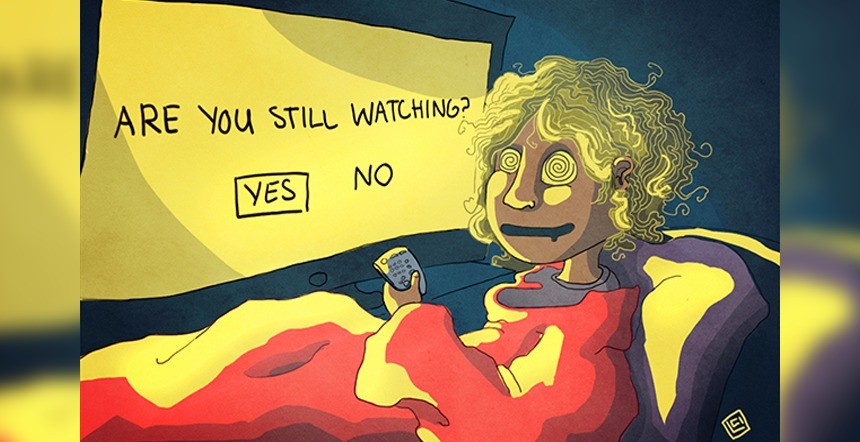The Binge Watching Blues
May 23, 2019
I am the first to admit that I have watched an entire season of a show in one day. Yes, one day. Twenty-two episodes of pure adrenaline. I woke up, ate breakfast and sat down to watch an episode. Then 9:00 p.m. rolled around. It was almost as if I was oblivious to the time passing. I did not give it much concern until I recently learned about the negative effects of binge watching, and why it is almost a contagion amongst teenagers.
 Usually in a television series there are about 20 episodes, each one ranging from 20 to 40 minutes in length. In a group of Charlotte Latin Students polled about their television habits, about 36% said that they have finished an entire season in one day. It is not uncommon for a teenager to watch more than two episodes every day. While that does not seem like that much, it adds up. Students consider binge watching to be pleasurable but they do not know the half of how their brain is reacting. Powell Paguibitan, the AP Psychology teacher at Charlotte Latin, explained that there are neurotransmitters in the brain that act as a control center for the rest of the body. Paguibitan said that the neurotransmitter, “specifically one called dopamine…is in charge of your brain’s reward centers, so when you are doing something that is rewarding, it might be eating food, it might be playing video games, or gambling or something along those lines,” it makes you want to do something again and again. Teenagers are very susceptible to the effects of dopamine. Something that has to be understood about dopamine is that it affects everyone differently, “but it specifically affects adolescents differently,” Paguibitan said. He explained that, “dopamine is very similar in structure to cocaine, and cocaine is highly addictive because it is one of the more rewarding drugs.” It brings one up rather than weighs one down, but it has very negative effects on the body.
Usually in a television series there are about 20 episodes, each one ranging from 20 to 40 minutes in length. In a group of Charlotte Latin Students polled about their television habits, about 36% said that they have finished an entire season in one day. It is not uncommon for a teenager to watch more than two episodes every day. While that does not seem like that much, it adds up. Students consider binge watching to be pleasurable but they do not know the half of how their brain is reacting. Powell Paguibitan, the AP Psychology teacher at Charlotte Latin, explained that there are neurotransmitters in the brain that act as a control center for the rest of the body. Paguibitan said that the neurotransmitter, “specifically one called dopamine…is in charge of your brain’s reward centers, so when you are doing something that is rewarding, it might be eating food, it might be playing video games, or gambling or something along those lines,” it makes you want to do something again and again. Teenagers are very susceptible to the effects of dopamine. Something that has to be understood about dopamine is that it affects everyone differently, “but it specifically affects adolescents differently,” Paguibitan said. He explained that, “dopamine is very similar in structure to cocaine, and cocaine is highly addictive because it is one of the more rewarding drugs.” It brings one up rather than weighs one down, but it has very negative effects on the body.
Teenage brains and adult brains tend to work differently on the subject of binge watching. “Teenagers are using different parts of their brain than someone who is an adult, and they are using what is known as the limbic system, more which is involved with rewards as well as other emotions. Myself as an adult would be using what is called the prefrontal cortex, and that is in charge of logic, reasoning and understanding,” Paguibitan explained. When adults are “binge watching,” they are aware of reality and therefore know that they have other things to do. A teenager watching is solely being run by his or her emotions and therefore is consumed by the show which makes it harder for him or her to stop watching.
 I often find myself watching a show and thinking, “wow, this character would be my best friend.” Paguibitan informed me that this is unhealthy for one’s mental health. Although it may feel like a character is supporting you, he or she cannot provide the real support that a friend should. “It is important to develop empathy by thinking you could be best friends with a character, but it is also important to understand that they are just characters.”
I often find myself watching a show and thinking, “wow, this character would be my best friend.” Paguibitan informed me that this is unhealthy for one’s mental health. Although it may feel like a character is supporting you, he or she cannot provide the real support that a friend should. “It is important to develop empathy by thinking you could be best friends with a character, but it is also important to understand that they are just characters.”
Dr. Mimi Nick, the neurobiology teacher at Latin said, “Typically people have a certain amount of energy they can devote to relationships and that is different for each person. But if you are spending so much time building a relationship with a TV character, you might let other relationships fall because you are overly involved with someone who’s not real.” Although TV can give someone something to talk about with friends, it can negatively affect his or her social life because the person is spending too much time with someone who is not real and cannot replace a friend.
It may feel comforting for the binge watchers to believe they are along for the ride with the characters in a show; however, when the program ends they are devastated, no matter the ending. Paguibitan said, “It’s this sense that the characters are now a part of your life. It is almost like seeing a friendship end. I think that this is where it gets dangerous because you are missing someone who never existed,” which clearly represents how forming relationships that are too close with imaginary characters can be detrimental to your mental health.
As for short term effects, binge watching can affect one’s mental and physical health on a daily basis. A big problem associated with binge watching is sleep deprivation. Netflix is wired to automatically start a new episode ev ery time the previous one ends, which makes it even harder to stop. Most teenagers save a little time at the end of the day to watch Netflix, but that time can become hours because of the infamous, “the next episode will start in 10 seconds” prompt at the conclusion of every show.
ery time the previous one ends, which makes it even harder to stop. Most teenagers save a little time at the end of the day to watch Netflix, but that time can become hours because of the infamous, “the next episode will start in 10 seconds” prompt at the conclusion of every show.
Watching too much TV at night is a direct cause of sleep deprivation. Sleep deprivation is a common problem in teenagers, especially after watching TV late at night. Jean Asinger, RN at Charlotte Latin, said she “sees students with symptoms of sleep deprivation on a daily basis. The symptoms include fatigue, moodiness, irritability, difficulty concentrating, forgetfulness, anxiety, depression, and an increased appetite.” Asinger and Nick had similar opinions in that both experts recommended that screen time should be limited before bed. Nick said that, “the recommendation is that you should not go on a screen for 2-3 hours prior to going to sleep.” However, that can be very unrealistic for teenagers. For high school students, the only TV time they have is before bed.
It is important to experience balance and for students to participate in activities that they enjoy, but watching too much TV can have detrimental effects on one’s mental and physical health. Once binge watching becomes a routine, the enjoyment of watching TV is no longer there. Students should limit themselves to one to two episodes a day, maximum. There is something special about watching a show that comes on TV once a week because the anticipation is really where the enjoyment comes from and when that time arrives, students should fully immerse themselves in the show, rather than mindlessly watching it.
